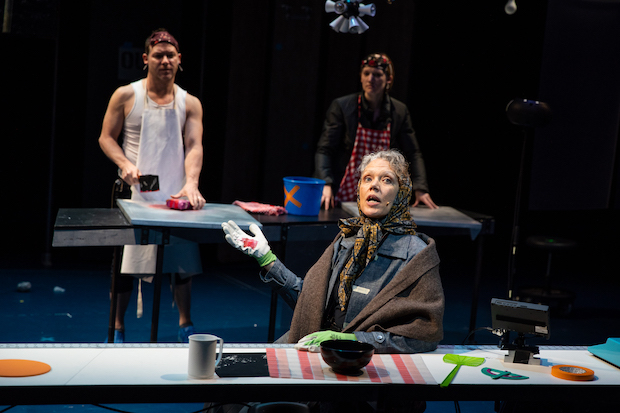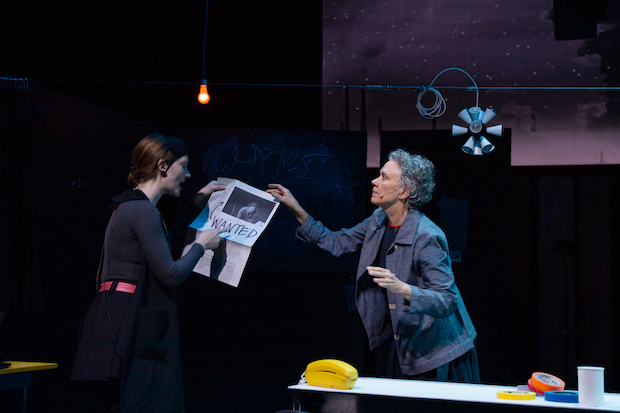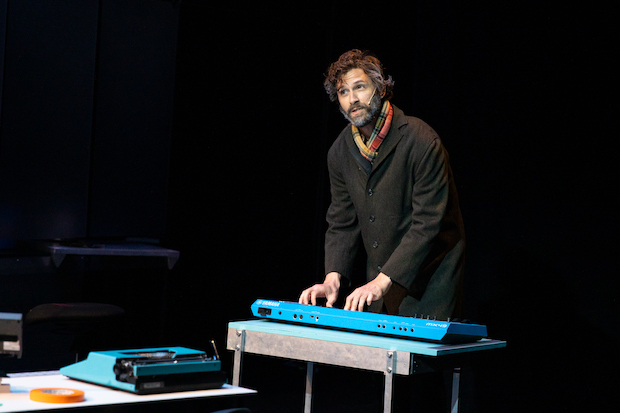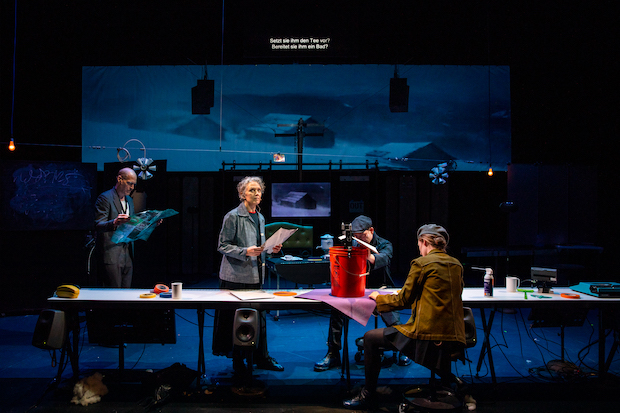Review: A Nice Russian Broad Turns Commie in the Wooster Group's The Mother

(© Nurith Wagner-Strauss/Wiener Festwochen)
The meeting of two pungent flavors raises the question of which one will win out: Takis Fuego stuffed with blue cheese — which taste lingers in your mouth the longest? Theatrically, this is the experiment posed by the Wooster Group's staging of Bertolt Brecht's The Mother, now making its New York debut at the Performing Garage following a world premiere in Vienna.
This is the group's first time tackling a work by the 20th-century German playwright, whose Epic Theater, and specifically his Lehrstücke (or learning plays), boldly defy the conventions of drama as laid out by Aristotle. Brecht went several steps further than even George Bernard Shaw in his quest to educate audiences and win them over to his brand of leftist politics. But the Wooster Group has been in business longer than Brecht was around to write plays, and its influence on stagecraft has been immense: It was the first major experimental troupe to embrace the use of video screens (now ubiquitous on and off-Broadway) and vocal amplification. Like Brecht, the Wooster Group is happy to draw attention to the artificiality of the theater, and to draw back the curtain on its creative process. But the similarities end there, as demonstrated by this formally bold yet thematically malnourished production.

(© Nurith Wagner-Strauss/Wiener Festwochen)
Literal malnourishment is the driving force behind The Mother, Brecht's final play to be produced in Berlin before the Nazi rise to power. Set in pre-revolutionary Russia, it tells the story of Pelagea Vlasov (Kate Valk), an illiterate Russian widow and mother of a worker (Gareth Hobbs). She wants to feed her son, but the soup she makes is awfully thin due to his recent wage cuts at the Suklinov factory. She worries that her son has fallen in with a bad crowd of radicals (Ari Fliakos and Erin Mullin), so she volunteers to hand out communist leaflets in his stead, lest his slashed wages turn into no wages. But her experience of the heavy-handed tactics of the capitalists draws her further into the movement, until she becomes a matriarch of the revolution.
As if caught in a red flash flood, director Elizabeth LeCompte clings to formal digression like a life raft. The play debuted in 1932, at the advent of film noir (but before the Hays Code), and LeCompte seems most interested in these dark classic films (she admits as much in a program note). Tver is absolutely crawling with wise guys in LeCompte's rendition. Valk performs with the stilted gestures and vocal inflections of an acting style long gone to the Hollywood Forever Cemetery, and Ari Fliakos shows off his spot-on screen gangster diction, which seems transported from another era under amplification (pristine yet disorienting sound design by Eric Sluyter). This approach might enhance a production of Arturo Ui, but one fails to see what it has to do with industrial action in pre-revolutionary Russia.

(© Nurith Wagner-Strauss/Wiener Festwochen)
Amir ElSaffar's original music is unlikely to lead anyone out of the garage humming for revolution, its dissonant melodies and ever-changing rhythms being far too complex to support a march. Irfan Brkovic's animated video design is the one constant reminder of the industrial context of Brecht's play, showing a dark skyline of smokestacks. Unfortunately, its cartoonish quality only adds to the quaintness of the antique Marxism on display here — almost like Hadestown.
For Wooster groupies, there are some old hits: A screen hanging over the audience (but facing the stage) runs barely visible black-and-white movies; exotic light fixtures hang from a line, never to be illuminated or referenced by the actors; a long table separates the stage from the audience, allowing Jim Fletcher (playing both "Teacher" and "Fyodor the Teacher") to step out of the action and lecture the audience on its context. Brecht would have probably enjoyed this last element, an alienation tactic perfectly in line with his anti-Aristotelean tastes — but I suspect he would have dismissed the rest as bourgeois decadence.

(© Nurith Wagner-Strauss/Wiener Festwochen)
It is easy to imagine how The Mother might have been updated to speak directly to 2021: It's about an average middle-aged woman radicalized by historical events and personally witnessed injustice, a relatable story following the Trump era and the Covid pandemic. It shows how the goals of labor sometimes clash with environmental imperatives, especially when the elite insist on passing along the cost to poor people (Suklinov promises to drain a nearby swamp in exchange for a pay cut from his workers, an echo of today's surcharges on small plastic items of all kinds). It also shows how the target of progressive fury is regularly the lowest representative of the middle class, rather than the actual rich, as shown when Pelagea reduces a shopkeeper to tears for failing to give away her merchandise (a scene excised from this production). At every turn, the Wooster Group declines to pursue this revitalizing approach, settling instead for its old bag of tricks.
This will come as a relief to anyone averse to Brecht's militant form of Marxism, which will surely include many representatives of charitable trusts founded on dubious fortunes. Those corporate not-for-profits will be happy to keep doling out grants to one of New York's most enduring downtown companies, now nearly half a century old. This is one of the rare cases in which a dead playwright is edgier than the living experimental theater staging his work. But when it comes to the collision of two distinct voices in the theater, always bet on the one that can still speak.











